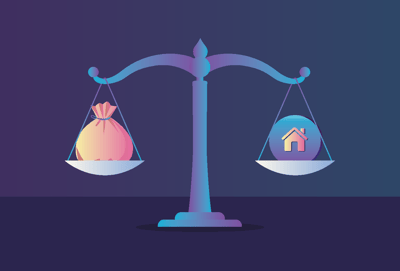Mortgage Rates
Get updated mortgage and interest rates
The Mortgage Interest Rate Guide
Mortgage interest rates, also known as loan interest rates, play a significant role in mortgage financing. Borrowers pay these rates to lenders in exchange for utilizing a mortgage loan. There are two main types of interest rates: fixed and variable. Fixed rates remain constant for the entire loan term, while variable rates can fluctuate based on external factors. The interest rate determines the percentage of the loan amount that borrowers must pay as interest. Higher interest rates result in larger monthly payments, as a significant portion of the payment goes towards interest. Conversely, lower interest rates lead to more affordable monthly payments. It's crucial to note that interest rates are subject to change and can be influenced by factors such as the overall economic climate and the monetary policies of central banks. Managing and understanding interest rates is essential for effective mortgage financing.

Get in contact for current mortgage rates
What factors influence Mortgage Interest Rates?
Economic Climate: The overall economic conditions have a direct impact on mortgage interest rates. During periods of economic growth and stability, interest rates tend to be lower, while in times of economic uncertainty, higher interest rates may be implemented to mitigate risks.
Central Bank Policies: The policies implemented by central banks, particularly regarding monetary policy, greatly affect interest rates. Adjustments to key interest rates by central banks are aimed at managing the economy and controlling inflation or deflation. Changes in these rates can directly influence mortgage interest rates.
Borrower Profile: The borrower's financial profile plays a crucial role in determining mortgage interest rates. Factors such as creditworthiness, income stability, and debt-to-income ratio are considered when assessing the risk associated with lending. Borrowers with a strong financial profile are more likely to secure lower interest rates on their mortgage loans.
Loan Type: The type of loan chosen also affects the interest rate. Mortgages can have fixed interest rates, where the rate remains constant throughout the loan term, or adjustable interest rates that can fluctuate based on market conditions. Different loan options come with different interest rate structures.
Understanding the relationship between these factors is vital for borrowers seeking a mortgage loan. By staying informed about the current economic climate, monitoring central bank policies, and maintaining a healthy financial profile, borrowers can optimize their chances of securing favorable interest rates for their mortgage loans.
The Impact of Interest Rates on Your Mortgage
Monthly Payments: Interest rates have a direct impact on the monthly payments of a mortgage or loan. Higher interest rates result in larger monthly payments, as a greater portion of the loan amount is allocated to covering the interest. Conversely, lower interest rates lead to lower monthly payments, as a smaller portion of the loan is needed to cover the interest expenses.
Total Costs: The interest rate significantly influences the total costs of a mortgage or loan. Higher interest rates over the loan's duration result in higher overall costs, as more interest has to be paid. On the other hand, lower interest rates can lead to savings in terms of total costs, making the loan more affordable in the long run.
Affordability: Interest rates play a crucial role in determining the affordability of a mortgage or loan. Higher interest rates can affect the borrower's ability to afford the monthly payments, potentially limiting their borrowing capacity. Lower interest rates, on the other hand, can improve affordability by reducing the monthly payment burden and making the loan more manageable within the borrower's financial means.
Refinancing Opportunities: Changes in interest rates can create opportunities for refinancing an existing mortgage or loan. When interest rates decrease, borrowers may consider refinancing to take advantage of the lower rates and potentially secure better loan terms. Refinancing can help lower monthly payments and overall interest costs, providing financial benefits and optimizing the borrower's financial situation.

Strategies for Obtaining Favorable Mortgage Interest Rates
Market Observation: Monitoring the interest rate trends is crucial for mortgage borrowers and those seeking loans. By keeping an eye on the market, borrowers can identify opportune moments to secure favorable interest rates and optimize their financing options.
Comparing Offers: Conducting a comprehensive comparison of mortgage and loan offers from different lenders is essential for finding the most competitive interest rates and favorable terms. It is recommended to gather quotes from multiple financial institutions to ensure a thorough evaluation.
Personal Credit History: Building and maintaining a strong credit history is vital for obtaining lower interest rates on mortgages and loans. By managing finances responsibly, making timely payments, and minimizing outstanding debts, borrowers can enhance their creditworthiness and increase their chances of securing favorable interest rates.
Professional Financial Advice: Seeking guidance from a qualified financial advisor or mortgage specialist can provide valuable insights into navigating the mortgage and loan landscape. These professionals can offer personalized advice, help borrowers understand the intricacies of interest rates, and assist in developing sound financial strategies.
By considering these factors—market observation, offer comparison, credit history, and professional advice—borrowers can make informed decisions, secure competitive interest rates, and effectively manage their mortgage and loan financing.
Working with a Mortgage Advisor
Navigating mortgage interest rates can be complex, but you don't have to do it alone. Working with a knowledgeable loan advisor can make a significant difference. We'll explain the value of professional guidance and how our experienced team can help you navigate interest rate options, tailor your mortgage to your financial goals, and provide personalized support throughout the process. Understanding mortgage interest rates is essential for making informed decisions about your loan. By familiarizing yourself with the factors influencing rates, the different rate options available, and the strategies for obtaining favorable rates, you'll be well-prepared to secure a mortgage that aligns with your financial goals.
Request current mortgage rate update
Guiding You Through Your Mortgage Journey in Germany
At finbird digital, we specialize in assisting expats as they navigate the mortgages and loans in Germany. Our goal is to provide comprehensive services that cater to your individual needs and help you secure the right mortgage. With our extensive experience, strong network in the real estate industry, and expert advice on mortgage rates, loans, interest rates, and finance, we are well-equipped to support you every step of the way.
How Can We Work Together?
We understand that getting a mortgage is a crucial part of your real estate buying journey in Germany. Each mortgage case is unique, and every buyer has different financial circumstances, preferences, and tolerance for risk. We are committed to making mortgage affordability a priority. We analyze your financial situation, explore various loan options, and assess interest rates to ensure that you find a mortgage that fits your budget and goals. Our team will guide you through the intricacies of mortgage rates, providing personalized advice and assistance to help you achieve your dream of homeownership in Germany. With our expertise in finance and real estate, we strive to simplify mortgages, loans and interest rates to ensure that you make sound financial decisions. To start the process, we will have an initial conversation to assess your current situation and discuss the mortgage rate options available to you. To help us better understand your needs, we will provide you with a confidential pre-intake questionnaire. Once you complete it, we can move forward and guide you through the next steps, helping you find the right mortgage solution in Germany.
FAQs
Below you will find the most common questions on how to calculate a mortgage, how to be eligible and what restrictions may apply when one want to obtain a mortgage.
-
What is required from me to calculate my mortgage in Germany?
To find which mortgage is right for you and also a realistic option, there are two important factors to consider. Your current household income and your available equity/down payment available to inject into the planned property purchase. Household income refers to the sum of income that all people are contributing to a joint household (e.g. spouse, life partner, family member). Equity does not only refer to cash alone and may also include equity held in stocks, bonds, commodities, crypto or other assets.
-
What effect will different amounts of savings/assets have on my mortgage interest rate and my monthly EMI?
Interest rate improvements happen in steps. This means that a higher amount of equity allocated towards a financing changes the risk profile for the lender and can therefore make a significant difference in available interest rate conditions. Finding the right savings amount that fits your overall abilities and preferences will require to match the available assets on the borrower’s side to the prevalent requirements and conditions for a financing from a pool of lenders.
-
How can I start the process of property buying in Germany and what are the steps?
A good start is to first assess what mortgage you can afford based on your current income and savings. With these two inputs, your mortgage can be calculated and your property budget can be realistically defined. Knowing your budget before you start your property search will save time as you will be able to make a realistic offer in a competitive market and you will not have a mortgage that is too high of a burden for your financial health. During your property search, you will have to then review financing offers, evaluate the property in terms of existing risks and finalize with a notary.
-
What role does my mortgage broker have and what are the involved costs of obtaining a mortgage?
Your financing advisor is also your sparring partner along your real estate buying process. You should coordinate together early on, ideally before you begin your property search, so your financing needs and property budget can be determined. The service of creating your ideal financing concept, providing you with financing offers, filing the mortgage application and finalizing the mortgage comes at no cost to you, because the mortgage broker assumes a high amount of work from the lender, so the bank only focuses on providing the loan product without advisory services. To get a free initial estimate, click the contact us button here and get the mortgage process started.
-
What can be done prior to finding a house if you want to close a deal quickly?
While your mortgage broker reviews your current income and equity numbers, she will be able to provide you with a pre-approved, non-binding mortgage confirmation. With this document, you can enter into negotiations for closing a transaction in a competitive real estate market, however the final and mortgage approval can only be made once the property in question is known and can be included in the process.
-
What are the main decisions I need to make to find the mortgage that best fits my needs?
Apart from the two main inputs – net income and available equity – you also need to develop a view on the current market and on how much security you prefer along with any flexibility you want to ensure during your mortgage commitment to a lender. This is relevant, because interest rates in Germany are usually set for a fixed period of time (10 year fixed rate being the most common). You can also secure today’s interest rate for a longer period of time, for example for 15, 20 or even 30 years. Longer durations come with interest rate premiums, so here the feasibility with your income always needs to be kept in mind. Your mortgage advisor will be your sparringspartner along the process. For more detailed information, visit our blogpost on mortgage financing.
-
How much savings should I at least have on hand before getting the mortgage process started?
The side costs or processing fees of a property purchase are standardized in Germany and consist of the purchasing tax (Grunderwerbssteuer), the notary and register fees (Grundbuch- und Notargebühren) and in some cases the realtor fee (Maklercourtage). All of these fees will always be calculated a percentage amount of the property purchasing price. When buying in Germany, you should ideally be able to pay the side costs from your savings. Your eligibility for a larger mortgage/loan (100%, 95%, 90% of the property value) then depends on your income and residency situation along with other factors. A solid estimate is to have 20% of equity/savings available for a typical property mortgage.
-
What are the restrictions of getting a mortgage to buy property in Germany?
For every borrower wanting to obtain a mortgage, two factors for a financing are relevant. The first is the property valuation and the second is the borrower’s personal credit rating. For the property valuation, the asking price for a property needs to correspond to its current market value to allow for sufficient collateral for the lender providing a loan. For the personal credit rating, the given income sources need to be sufficient to cover a monthly mortgage rate and still leave enough breathing room for everyday expenses as well as unexpected costs. Additionally, your age becomes relevant, because your income situation will change once you become a pensioneer which in turn effects the maximum duration of a property loan.
-
What are the restrictions getting a mortgage to buy property as an expat in Germany
In addition to the restriction that apply to every borrower in Germany, there are some additional factors that become relevant once you are a foreigner who wants to buy a property in Germany. Your current residency status is a decisive factor when determining your eligibility for a mortgage to buy property in Germany. EU citizens can usually expect that the same requirements are applied to their case as would be applicable for a German citizen (e.g. up to 100% of the property value). With a permanent residency, you will significantly increase your chances for a higher available loan amount. As a blue card holder or with a dependant visa there are fewer options available, so it can be recommendable to wait until you receive the right status option which is usually linked to the time you have spent in Germany. For more information, check out our blogpost on your residency status.
-
Difference between getting a mortgage to buy an existing vs. a newly built property.
Newly builts and existing buildings have both benefits and downsides. As most properties are existing buildings you will have a larger pool to choose from, while more risks need to be evaluated than with a new property. You might want to include modernisation measures in an existing property for which you will be eligible to include one or more subsidizes modernisation loan in your overall financing concept. For newly built properties on the other hand the price will be higher as you the standard is state of the art. On the financing side, you also have a different payout schedule for a newly built, as it may take month until you can move in. You will also have to consider flexibility options in your mortgage contract, when you sign a mortgage many months before your property is ready to be taken into possession. Your mortgage advisor will be able to provide you with further details. If you want to learn more, get the process started with finbird digital.
-
What options are available for a mortgage/financing to optimize my interest rate?
As there are a number of products available for financing different types of property transactions it is possible to create a mix of financing products that will, in some cases, allow an optimization of the overall interest rate paid for a mortgage in Germany. This is often the case, when subsidized loans are included, for example when one plans modernisation measures for an existing property. In such as case, you will have a main mortgage from your primary lender, who will include a subsidized loan tranche as part of your overall financing concept. Have your mortgage advisor review your individual case and your options here.
-
How can we know whether an asked property price is the market value and will be financed in Germany?
When reviewing your mortgage application, a lender will always need to evaluate not only your personal eligibility for a mortgage but also if the property in question is par to market value. Lenders use a specific database for property valuations that tracks a large number of properties and their respective market valuations. As your mortgage advisor also has access to this database, she will be able to benchmark an asking price received from a property seller or realtor and if price is feasible to ist market valuation. As a bank will use a more conservative your mortgage advisor can provide a probability if a financing will be possible or if you need to increase your savings portion. To get the process started, click on the contact us button here.
